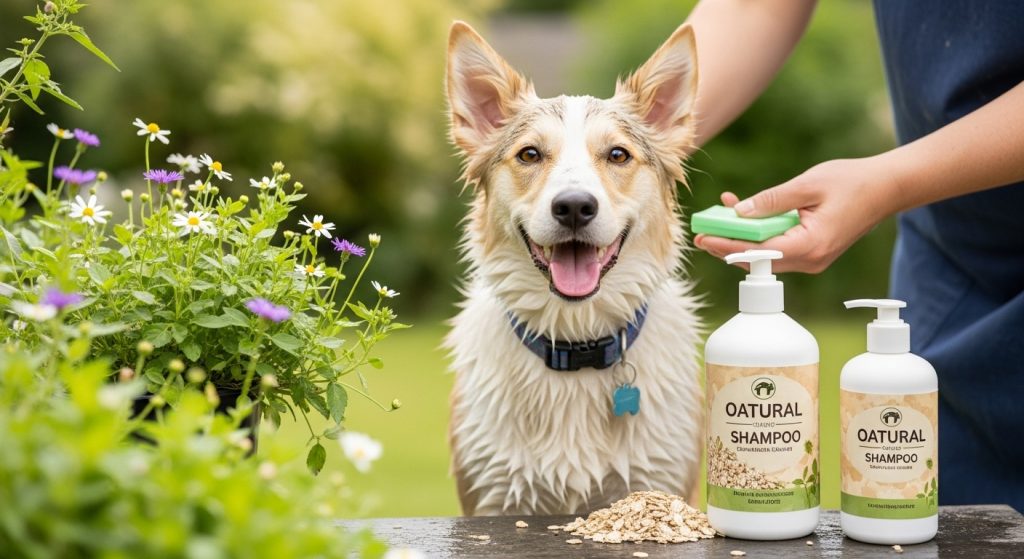Introduction
If your dog constantly scratches, licks their paws, or suffers from red, irritated skin, they may be struggling with allergies. Allergies in dogs are common and can be caused by many triggers such as food, pollen, dust, or fleas. While medications can help, many pet owners prefer a more natural, holistic approach to healing.
In this article, we’ll explore how managing dog allergies naturally and effectively can improve your dog’s comfort and overall health. You’ll learn what causes these allergic reactions, discover natural remedies that work, and understand how to create a long-term allergy management plan that actually lasts.
Understanding Dog Allergies
What Causes Dog Allergies?
Dog allergies occur when your pet’s immune system overreacts to harmless substances. Common triggers include:
-
Environmental allergens: pollen, mold, grass, and dust mites
-
Food allergens: beef, chicken, dairy, or wheat
-
Flea bites: a single flea bite can trigger severe itching (flea allergy dermatitis)
When a dog’s immune system detects these allergens, it releases histamines that lead to itching, redness, and inflammation.
Recognizing the Symptoms
Common signs that your dog may be allergic include:
-
Persistent scratching or licking
-
Ear infections or head shaking
-
Hair loss or “hot spots”
-
Watery eyes or runny nose
-
Sneezing and coughing
If your dog displays any of these symptoms, consult your veterinarian to confirm the allergy type. Identifying the root cause is the first step in managing it naturally.
Why Go Natural?
Natural allergy management focuses on strengthening the immune system and reducing exposure to allergens rather than masking symptoms with drugs. This holistic approach is gentler, long-lasting, and minimizes side effects.
Natural Remedies for Managing Dog Allergies
1. Improve Your Dog’s Diet
A healthy diet is the foundation of allergy prevention. Switch to a limited-ingredient or hypoallergenic dog food made with high-quality proteins and natural ingredients. Avoid artificial additives and grains that can worsen inflammation.
Top anti-allergy foods:
-
Salmon or sardines (rich in Omega-3 fatty acids)
-
Sweet potatoes
-
Pumpkin
-
Blueberries
-
Coconut oil (small doses)
Adding probiotics can also support gut health and reduce allergic reactions.
2. Soothe with Natural Supplements
Certain supplements can naturally reduce inflammation and strengthen immunity:
-
Omega-3 fish oil: reduces itchiness and promotes skin healing
-
Quercetin: known as “nature’s Benadryl”
-
Coconut oil: antimicrobial and soothing for dry skin
-
Chamomile tea: a gentle, natural rinse for irritated skin
Always consult your vet before introducing new supplements.
3. Keep Allergens Away
Regular cleaning can dramatically improve your dog’s comfort:
-
Wash bedding weekly with fragrance-free detergent
-
Vacuum carpets and furniture frequently
-
Use an air purifier to reduce dust and pollen
Bathing your dog once every 2–3 weeks using natural oatmeal or aloe-based shampoos can wash away allergens and relieve itching.
4. Natural Flea Control
Instead of chemical flea treatments, try these natural alternatives:
-
Apple cider vinegar spray: mix 50/50 with water and spray your dog’s coat
-
Diatomaceous earth: sprinkle lightly on your dog’s bed (not directly on the pet)
-
Essential oils (diluted): lavender, peppermint, or cedar oil repel fleas naturally
Building a Long-Term Allergy Management Plan
Track and Identify Triggers
Keep an allergy journal to note when symptoms flare up. Record what your dog eats, where they go, and what the weather is like. Over time, you’ll spot patterns that help identify specific triggers.
Strengthen the Immune System
Boosting your dog’s natural defenses helps reduce allergy severity:
-
Provide balanced meals with antioxidants and vitamins
-
Ensure regular exercise for circulation and detoxification
-
Maintain low-stress environments since stress weakens immunity
Work Closely with Your Veterinarian
A natural approach works best when combined with veterinary guidance. Your vet may recommend allergy testing or homeopathic remedies tailored to your dog’s specific needs.
Create a Consistent Routine
Consistency is key to long-term results. Stick to your chosen natural care plan for at least 2–3 months before evaluating results. Over time, you’ll notice fewer flare-ups and a happier, healthier dog.
Managing dog allergies naturally and effectively is about patience, observation, and care. With the right combination of natural remedies, clean environment, and nutrition, your dog can live comfortably without depending on harsh chemicals.
Your furry friend deserves relief — and with a holistic approach, you can make that happen naturally.




